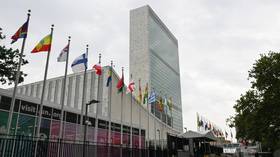Democrats urge Biden to drop Julian Assange charges

Several Democrats in the House have penned a letter calling for the immediate release of WikiLeaks co-founder Julian Assange, urging the Department of Justice to drop its charges against the publisher and halt extradition proceedings aiming to bring him to the US to face prosecution under the World War I-era Espionage Act.
The group of progressive lawmakers, known as ‘the Squad’, addressed their letter to Attorney General Merrick Garland on Tuesday to mark the fourth anniversary since Assange’s 2019 arrest, saying the charges against him represent a serious threat to the free press.
“We write you today to call on you to uphold the First Amendment’s protections for the freedom of the press by dropping the criminal charges against Australian publisher Julian Assange and withdrawing the American extradition request currently pending with the British government,” the lawmakers said.
They went on to cite warnings from a long line of human rights, civil liberties, and press freedoms groups – among them the ACLU, Amnesty International, Reporters Without Borders, the Committee to Protect Journalists, Defending Rights and Dissent, and Human Rights Watch – which have argued Assange’s case poses “a grave and unprecedented threat to everyday, constitutionally protected journalistic activity.”
Assange was arrested by the British authorities in 2019 after losing political asylum status at the Ecuadorian Embassy in London, where he was holed up for more than seven years for fear of prosecution by the US due to WikiLeaks’ publication of large amounts of classified material. Under then-President Donald Trump, the US Department of Justice unsealed a multi-count indictment against Assange on April 11, 2019 – the same day of his arrest – slapping him with 17 charges under the Espionage Act, which can potentially carry the death penalty.
He has been held at the UK’s maximum-security Belmarsh Prison in the years since, as Washington presses an extradition request to bring Assange to the US to face his charges. The publisher’s legal team has appealed a prior ruling in favor of extradition on the grounds of Assange’s declining health, a process which continues to play out in the British courts.
The Democratic lawmakers argued that Assange’s prosecution would “greatly [diminish] America’s credibility” as a defender of human rights around the globe and set a dangerous legal precedent “whereby journalists or publishers can be prosecuted.”
“In the future the New York Times or Washington Post could be prosecuted when they publish important stories based on classified information. Or, just as dangerous for democracy, they may refrain from publishing such stories for fear of prosecution,” they continued.
Assange’s charges stem from the 2010 publication of a massive trove of classified documents obtained by US army intelligence analyst Chelsea Manning, including material suggesting US forces committed war crimes in Iraq and elsewhere. Manning was charged and sentenced to 35 years in prison, but was later released after President Barack Obama commuted Manning’s sentence.















